#The Resurrectionist
Text
The New S2 Poster Details
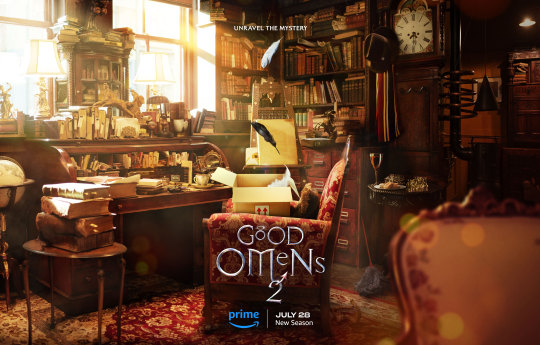

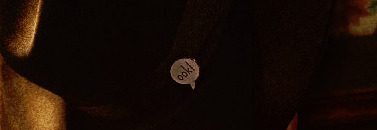
Terry's hat and scarf ❤ With an ook pin! ❤
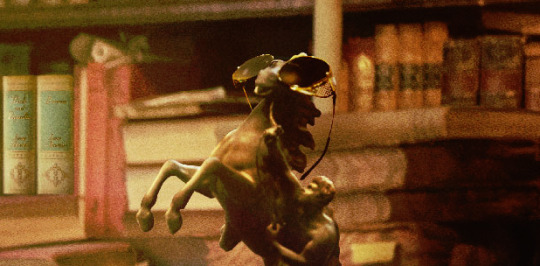
Crowley's old glasses on the statue. The statue itself is the Marly Horses by Guillaume Coustou the Elder.

Aziraphale's bow tie on the floor 👀

The cardboard box - long ago Neil shared on his instagram: Game on! There are mysteries, histories, secrets revealed and Something Too Terrible To Be Revealed on the way. Also a cardboard box.

Three feathers. One white, one blac and one white with a bluish/grey tinge (if it's not a shaddow)?

The angel mug is back 🥰

'The Resurrectionist' matches with skull and crossbones. In the previous poster there was a The Resurrectionist leaflet.
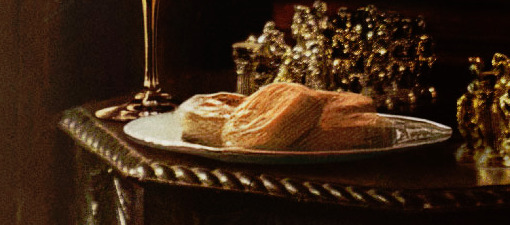
Again the Eccles cakes (already were in the previous poster)
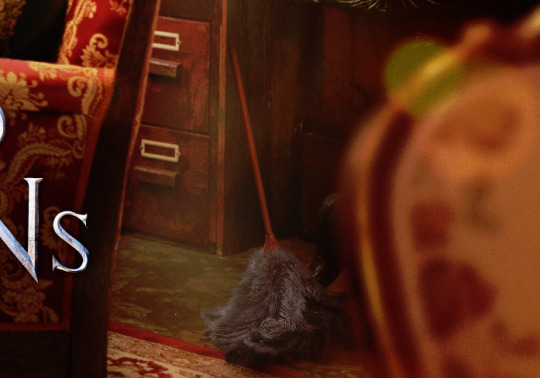
Feather duster with dark gray/black feathers

On this shelf there books also in the previous poster, but at different place 🤔: The Crow Road, Catch-22.
And: The Curious Incident of the Dog in the Night-Time by Mark Haddon, from wikj: mystery novel by nritish writer Mark Haddon. Its title refers to an observation by the fictional detective Sherlock Holmes in the 1892 short story The Adventure of Silver Blaze
And: No Woman No Cry: My Life with Bob Marley by Rita Marley a memoir of Bob Marley by wife, Rita.
Also heard the people say that the right one of the Catch-22 they see Gabriel García Márquez on the spine (I can't read it :)).


Lord Jim and Treasure Island have also been identified in the previous poster but now are in a different place 🤔👀.

Three books by Jane Austen: Persuasion, Pride and Prejudice and Emma. We have already seen Pride and Prejudice in the previous poster but it was a different edition so Aziraphale has more than one :).

Candy?
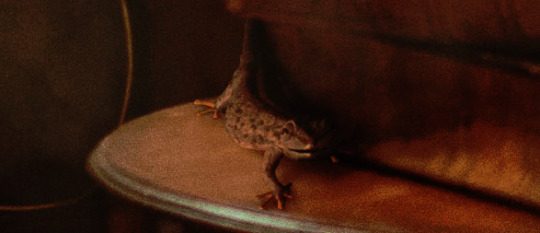
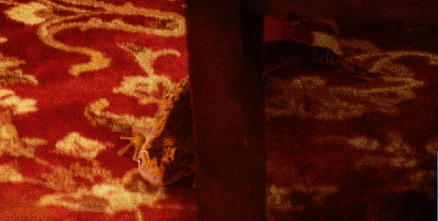
Again geckos! :) 🦎 (there were three in the previous poster)
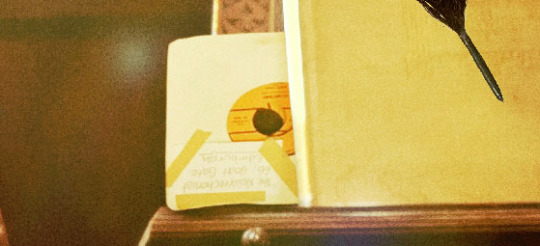
The Buddy Holly Everyday was also in a different place in the previous poster. And there is a note on it
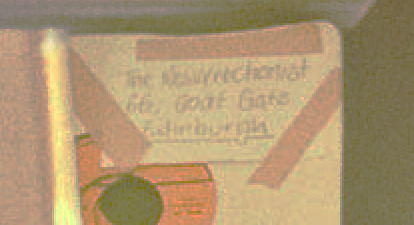
The Ressurectionist, 66. Goat Gate, Edinburgh 👀.
#good omens#gos2#season 2#s2 posters#posters#fun fact#jane austen#pride and prejudice#emma#persuasion#No Woman No Cry: My Life with Bob Marley#rita marley#The Curious Incident of the Dog in the Night-Time#Mark Haddon#The Resurrectionist#cardboard box#terry's hat#terry's scarf#crowley's glasses#aziraphale's bow tie#s2 poster details#goat gate#edinburgh
4K notes
·
View notes
Text
I need to talk about the Edinburgh minisode, because I have SO. MANY. THOUGHTS.
It's sort of an afterthought minisode in some ways. Before the Beginning gives us so much giddy joy (despite the ominous foreshadowing). 1941 gives us all the giddy romance. Job gives us so much insight into both characters histories and how they came to be who they are and work together...
The Resurrectionists gives us a morality play, basically, but also gives us Crowley high (and HIGH) on laudanum and plenty of bright shiny bits...
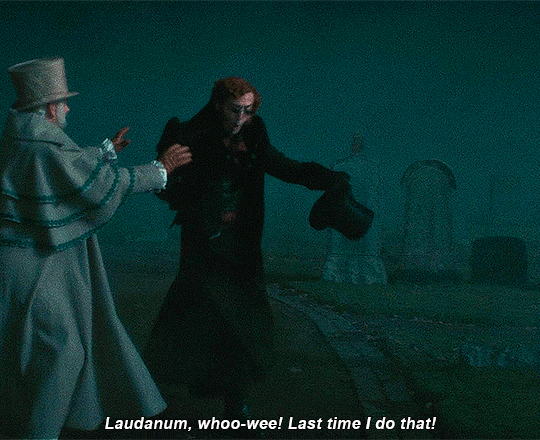
...so the morality side maybe doesn't get as much focus.
Which is a shame. Because the Edinburgh episode demonstrates perfectly the flaw in Aziraphale's understanding of the world that leads to him going to heaven.
When we start out in 1827, we are introduced to grave robbing and Aziraphale immediately decides that it is Bad (a sin). He does all he can to prevent the young woman he meets and likes from doing Bad (sinning), assumably to try to pave her way into Heaven. And Crowley tries to help her with her grave robbing, much to Aziraphale's chagrin.
Grave Robbing = Bad; Crowley supports Grave Robbing; Crowley=Bad
When they meet Mr Surgeon, and Crowley starts to ask some pointed questions meant to poke holes in Aziraphale's certainty, he flips entirely the other way, without noticing any of the other moral greyness (like the fact that Mr Surgeon would never take the risks or do the dirty work himself. Which is pretty important, since we learn in Edinburgh in the present that Mr Surgeon was so convinced of his own superiority and importance later on in his life that he started murdering people (probably "unfortunates" like Elspeth) when he couldn't get corpses fast enough).
Grave Robbing = Good; Crowley supports Grave Robbing; Crowley = Good
When he is then confronted with the idea of selling Wee Morag's body, and Crowley points out it is different when it's someone you know, Aziraphale is basically frozen in indecision. He doesn't know what the good thing is anymore.
He spouts the party line about the fact that starting off poor somehow gives Elspeth an advantage when it comes to Heaven, but is unable to explain why or how, not even to himself. And when he's put on the spot as Elspeth tries to kill herself, he doesn't have any arguments to offer.
CROWLEY: Say something! That... convinces her that poverty is ineffably wonderful and that life is worth living. Go on!
But despite all the moral ambiguity present throughout the episode, Aziraphale still sees everything as black and white. First, grave robbing is bad, then it is good. First, Crowley is bad (when he has the opposite position to Aziraphale), then he is good (when he has the same position). Aziraphale never understands Crowley's constant questions are a challenge to the very idea that there IS a 'good' in this situation. He never examines or questions the complex systems of class and sexism and capitalism which force Elspeth to this desperate recourse, or the laws which prevent Mr Surgeon from accessing bodies for research via legal means.
He doesn't see the systemic injustic. He just sees individual moral actors making either good or bad choices.
(and just to deviate slightly from the Edinburgh minisode -- while he says he understands that sometimes things are not just black or white but also grey, in 1941 - I don't actually think his grey and Crowley's grey mean the same thing. The 'greyest' thing that Aziraphale does in 1941 is help a showgirls theatre and hide information from Hell - this is not the same thing as truly seeing that some situations simply don't have a Right Thing to do, or understanding that systems shape and control individuals' decisions, so the idea that humans all have the same ability to choose Right is an illusion.
AZIRAPHALE: You know, they cannot be truly holy unless they also get the opportunity to be wicked.
So it is no wonder at all that when the Metatron offers him the opportunity to run Heaven, he doesn't see a broken institution or systemic oppression/injustice, but rather a series of bad actors preventing Heaven from achieving the Goodness it is meant to represent.
#ok that was long so I hope it made sense#good omens#Obviously the job minisode is my favourite#I mean...#bildad the shuhite#but this one is SO flipping insightful and deep and is sort of the crux of the whole thing#good omens 2#good omens meta#good omens analysis#ineffable husbands#ineffable idiots#aziraphale#crowley#aziracrow#the resurrectionist#laudanum
264 notes
·
View notes
Note
Hi friend this ask is a request for you to wax lyrical about Crowley slowly dying of a poisonous dose of laudanum, because it seems That Scene is still on all our minds. <3
Godbless (they said agnostically). This is going to be a mess of a response because I have been working a lot of overtime and am pretty sleep deprived, and also because there are a lot of angles to this.
First off: you're so correct to point out that laudanum is an analgesic and not literally a poison, because I think this slots in so nicely with the pattern of stuff we see Aziraphale consume and why (food and wine, for sensual pleasure) and stuff we see Crowley consume and why (alcohol for numbing and six shots of espresso to brace himself, and now laudanum, a medical grade numbing agent, at a dosage that would have killed Elspeth had he not intervened).
To really get into this I'm going to have to talk a little about something I have a lot of approximate knowledge about: Victorian era medicine. Why I find poison sexy (maybe compelling is a better word here) is partially tied up in the Victorian era and this exact subset of knowledge, which I am going to disclaim right now as not very precise. I research stuff primarily to regurgitate it in fiction, and not for complete factual accuracy.
First off, let's take a moment to admire Crowley's prognosticative abilities once again.
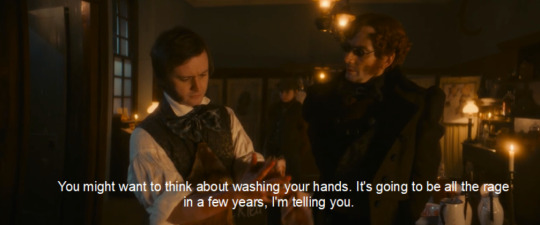
Antiseptic is 25 years off, germ theory is held in disdain by the western world, but here's Anthony "that went down like a lead balloon" Crowley just trying to be helpful to this guy covered in blood.
Antiseptic was not in common medical and surgical use until the 1850s. It was pioneered by Joseph Lister, who actually worked at the University of Edinburgh, which was kind of the place to be in terms of medical breakthroughs of this time period. Before the advent of washing your hands and sterilizing surgical equipment, something like 2/3rds of surgical patients died either on the operating table or of infection afterwards. Medicine during this time period was difficult, dangerous work with a high risk of complications, and surgery was haunted by death and disease. Dr. Darymple would have administered laudanum to a patient and then strapped their limbs down and put something in their mouth so they didn't bite through their tongue before cutting into them, and even if he was a good surgeon they might have died a week later from gangrene or sepsis anyway.
It's in this world that laudanum and opium more generally got romanticized by literature and poetry. The Victorians loved opium, but the symbolism of the poppy, from which opium is derived, has been sleep and death since the classical world. My go-to example of the blending of these themes (poppies as sleep and death symbolism and this time period's interest in the classical world) is The Garden of Proserpine by Algernon Charles Swinburne, of which I will include an excerpt below:
No growth of moor or coppice,
No heather-flower or vine,
But bloomless buds of poppies,
Green grapes of Proserpine,
Pale beds of blowing rushes
Where no leaf blooms or blushes
Save this whereout she crushes
For dead men deadly wine.
The symbolic connection between opium (and thus laudanum) and sleep and death is my strongest association with either drug. The poppies = death association is used all the time even in the modern day. See this song, Flowers, from the musical Hadestown:
Lily white and poppy red
I trembled when he laid me out
"You won't feel a thing," he said, "When you go down"
Nothing gonna wake you up now
Poppy symbolism is doing a lot of work in this song, actually, drawing a line between virginity and death, and the flower imagery standing in for both Euridyce's sexual relationship with Hades as well as her death but I disgress.
This is my personal context for laudanum and opium. I think it's encouraged to read the sleep and death connection into both of these medicines, both by the artistic tradition that arose contemporaneously with their use and by continued references back to it in the modern day. I am thinking of the scene in Inception where the opium den they visit is full of people who go to be drugged in order to dream their lives away as just one of many other modern day examples. Opium is sleep and sleep is death.
So while the laudanum is not literally poison, I think there is cultural context in which it is possible to read it as symbolically poison, regardless of whether Crowley's not-actually-human body should be able to withstand it. I think that it is compelling to read it as such, given the above-mentioned pattern of Crowley's habits of consumption.
I've seen a lot of posts about how the next time Aziraphale and Crowley see each other after this flashback is the time Crowley asks Aziraphale to bring him holy water and Aziraphale refuses on the grounds that he won't provide Crowley with a suicide pill. While I think this says more about Aziraphale than it does about Crowley (Crowley has never struck me, by behavior or attitude, to be the kind of person who would kill themself, whereas for Aziraphale one of the worst things that could happen would be losing Crowley) there is something there, something in that tartan thermos, something in the idea that Crowley would drink his death.
There is one more angle to this, and this is going to be a bit of a reach. I once read an analysis post in another fandom about the symbolism of poison as a choice of weapon. This line will haunt me until my grave: "a man stabs, a woman poisons". Just as a sword is a phallic symbol, poison (to me) is a feminine coded way to kill another person. For more context, please read The Laboratory by Robert Browning, a poem about a woman procuring a poison to kill her husband's lover, written by another Victorian poet. Crowley dying being discorporated by self-administered poison compels me for all the reasons mentioned above but also for gender reasons. Nonbinary icon.
Crowley dying being discorporated by self-administered poison feels like it is in conversation with two events that happen chronologically later but narratively earlier: the "suicide pill" conversation and Crowley trying to wait out the apocalypse in the bar after the bookshop burned. For all intents and purposes he seems to have given up at that point and only pulls himself together because Aziraphale appears to him and proves he isn't gone gone. It makes sense as an exploration of Aziraphale's anxieties (the suicide pill convo), and the extent to which they might be justified (Crowley drinking as the world ends). It's interesting it's compelling it's symbolically rich it's consistent with characterization choices in the show.
I think realistically Crowley would keep from Aziraphale that he was in pain until he physically couldn't do so, because it would threaten the wall they've had to erect to keep each other safe to do otherwise, but in a scenario where Crowley was hurt, properly hurt, Aziraphale would find a way to excuse them because he would not stand for Crowley suffering.
Just...
The idea of Aziraphale gathering Crowley close in the dark graveyard, feeling him stumble, Crowley who is so bright and brave and beautiful reduced to clutching to Aziraphale and the pair of them trying to will him back to health the way they can choose to sober up, and failing... Crowley because by this point he's too weak, he waited too long putting up a front for Aziraphale, Aziraphale because of conflicting magic or because he's too anxious, his own personal moment of the gun shaking in Crowley's hands during the bullet catch, where he knows what he has to do but he can't do it, can't trust himself not to make it worse.
And then Crowley's body going cold, Aziraphale holding it and crying because despite knowing it's just a body and that Crowley can get another one, he failed to protect him. Crowley died for someone and Aziraphale couldn't prevent it. And the things they don't say to each other, all rushing in to fill the silence left by Crowley's stopped breath. Aziraphale whispering to him, kissing his temple, part of him wondering if he'd ever be able to do this if he wasn't already gone.
It would just be really good, okay. It would be really good.
#the resurrectionist#good omens#meta#i stayed up way too late to write this and now i am going to sleep#tw suicide#tw death
251 notes
·
View notes
Text
Still thinking about Aziraphale's press card number being 66
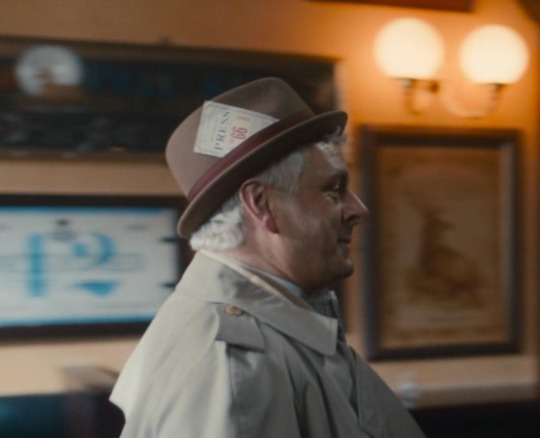
I just love this detail and not seen anyone post about it before
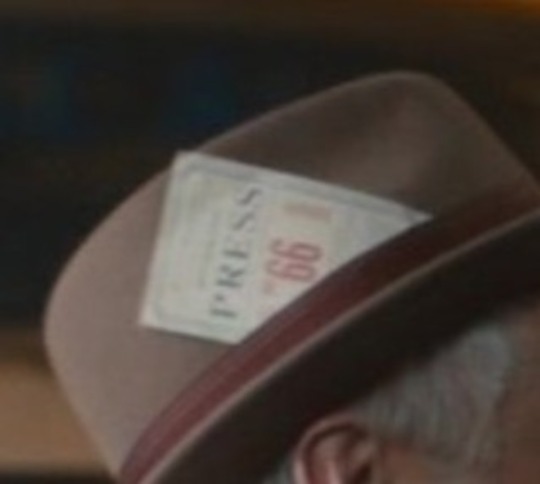
#good omens#Aziraphale#mr fell investigative journalist#the resurrectionist#good omens s2 ep 3#ineffable husbands#neil gaiman#give me the fact#number of the beast#well nearly#66#good omens 2#michael sheen#delicious details#costume design#babygirl living out her noir detective fantasies#love this for her
208 notes
·
View notes
Text
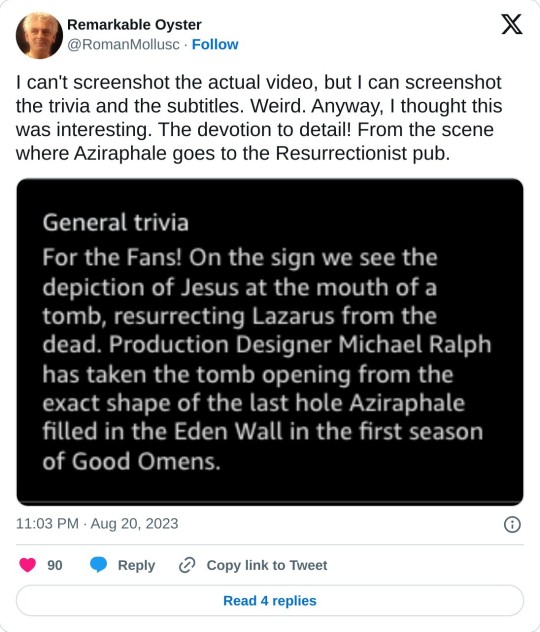
"General trivia
For the Fans! On the sign we see the depiction of Jesus at the mouth of a tomb, resurrecting Lazarus from the dead. Production Designer Michael Ralph has taken the tomb opening from the exact shape of the last hole Aziraphale filled in the Eden Wall in the first season of Good Omens."
Wow it's true! 😲🤩


162 notes
·
View notes
Text





First impressions
↳ Good Omens
↳ Season 2, Episode 3
Ep 1 // Ep 2 // Ep 4
#first impressions series#so much Burke and Hare energy in this Ep#good omens#crowley#aziraphale#the wee morag#the Bentley#gomens#my gif#ineffable husbands#ineffable idiots#the resurrectionist#my post
78 notes
·
View notes
Text
absolutely had to make this


I don't normally do this, but when a scene lives in your head for days it's worth quickly scribbling it down with the crayola markers on hand 🥲. As you can see, I really only thought through Clark's part. @frownyalfred
#the resurrectionist#ao3 author#Not my fic!#Borderline#Traditional art#batfamily#@frownyalfred#I don't know how to do the tagging thing
77 notes
·
View notes
Text
I wish I could draw. I need more art of the Resurrectionist scene where Aziraphale and Crowley are talking with Mr Dalrymple because the moment when Aziraphale realizes the object in the glass is a tumor of a dead child, he pulls it closer to himself, grief-stricken. He just loves humans so much. 😭🥺
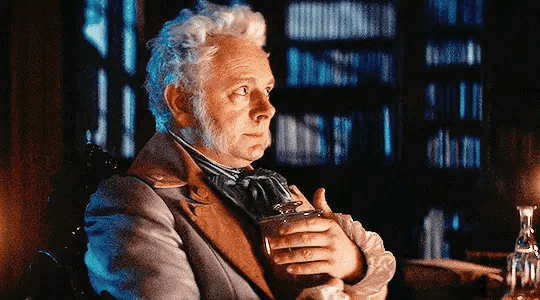
#aziraphale#aziraphale is adorable#good omens#good omens2#analysis#aziraphale loves humans#the Resurrectionist#mr dalrymple#aziracrow#crowley x aziraphale#ineffable husbands
25 notes
·
View notes
Text
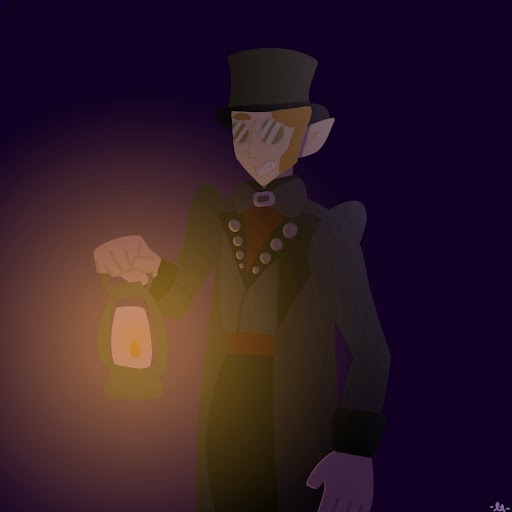
this shit took me two and a half hours to do. i would like to say a collective fuck you to whatever era this minisode was in for giving me such a hard time and i'd also like to give a fuck you to lighting/shadows
#anthony j crowley#the resurrectionist#good omens#good omens s2#scottish crowley#good omens fanart#i have a love-hate relationship with drawing things#vanny does art
26 notes
·
View notes
Text
Angelic Bar Keeper. Why is the bar keep in The Resurrectionist is wearing the tartan pattern reserved for Angels?
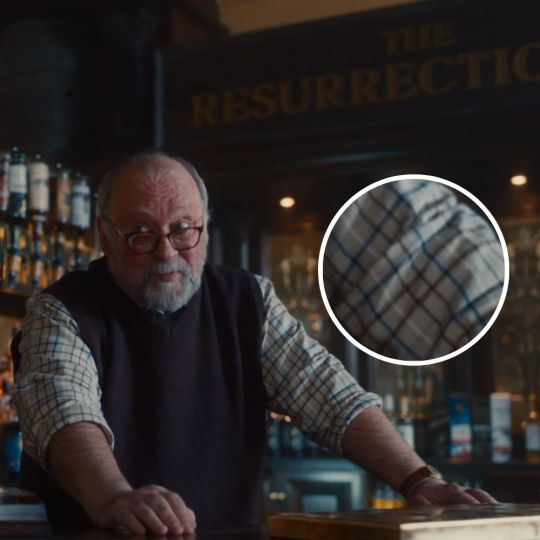
#good omens#good omens 2#the resurrectionist#heavens dress tartan#tartangate#why doesn't aziraphale recognise you if you're angel#it's because you're not#metatron theory#book of life theory#metatron's pawn
68 notes
·
View notes
Text
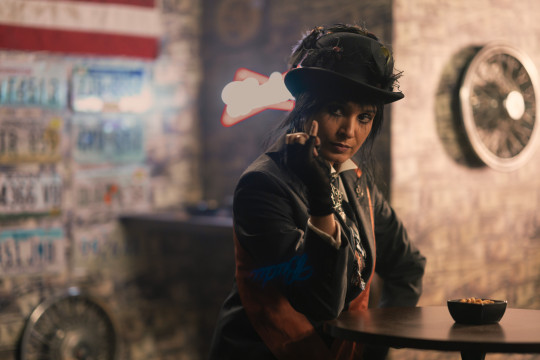

#good omens#gos2#season 2#photos#promo photos#show promo photos#hq photos#shelley conn#beelzebub#2ep6#2i6i7#the resurrectionist
1K notes
·
View notes
Text
Felt like sharing some speculation today:
All right, so we know My Hero Academia has the something of the same premise as X-Men in the sense that select a group of humans were suddenly born with powers, the whole 'evolution leaps forward’ deal.
We see in My Hero how the First Generation of people with Quirks, especially the ones who appeared non-human or semi non-human, were originally ostracized like the mutants of X-Men are, but then more people were born with powers and then more people had powers until it became a widespread phenomenon and ‘normal’ people became the minority and society had to restructure itself to accommodate the new normal.
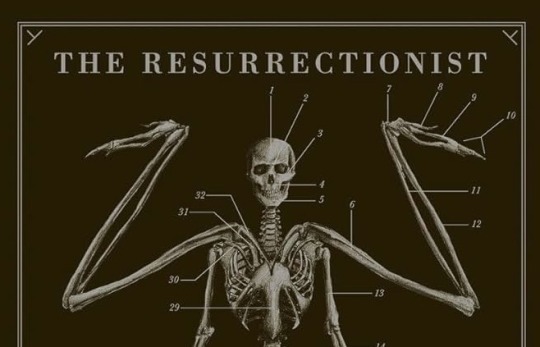
But have you read The Resurrectionist: The Lost Work of Dr. Spencer Black?
The plot is a 19th century doctor who theorizes that mythical creatures like the minotaur, harpies, sirens, and the like all existed millions of years ago but slowly interbred with humanity and eventually died out altogether. So he believed that when someone was born with extra fingers, limbs, a tail or otherwise didn’t have the typical human shape, it wasn’t so much a mistake in genetic coding as it was the extremely recessive genetics of those ancient creatures trying to reoccur in the modern day.
...
Definitely an interesting premise, so now I’m wondering if the My Hero world has a cult, conspiracy theorists, or even some scientists/historians that have similar views regarding mythology.
If this whole Quirk thing happened back in the Stone Age where no one had the benefit of science or awareness of DNA, anyone born with an otherworldly power would have been worshipped as a deity. Or the ones born with a non-human appearance would have been reviled as monsters.
So following the idea of The Resurrectionist, maybe the sudden appearance of superpowers did lead people to take a closer look at the old myths and consider the stories of the gods/goddesses of old were originally stories of people with 'Quirks' who rose to power. Humans with meta-powers ruled the world for a few centuries, then those powers inexplicably died off. For a variety of reasons or maybe unknown reasons, humanity lost that history but remembered the old stories and chalked them up to just myth until the powers that made it possible began to reappear full force several millennia later.
Some myths began as historical events but in being handed down hundreds of generations, the multiple tellings and retellings exaggerated them into the realm of impossibility.
Lightning/electricity powers: Zeus, Thor, Hinon
Fire powers: Hephaistos, Surtr, Hestia, the phoenix
Foresight: Any seer, prophet, or oracle that appears in any myth ever
Ice powers: Yuki-onna, Skadi, Morana
Water powers: Poseidon, Chalchiuhtlicue, Anuket, Tlaloc
Plant-related Quirks: Demeter
Gigantification Quirks: Giants, titans, nephilim
Ryukyu: Is a dragon. ‘nuff said.
All Might: Herakles
Tokoyami having a bird head but otherwise appearing human is pretty reminiscent of the old Egyptian gods.
Hawks: Any winged creature; take your pick. Personally, the one that comes to mind for me is Hermes. He only had wings on his sandals, sure, but the trickster archetype resonates.
Tsuyu: Naiads, nymphs, rusalki, any kind of water fae
Momo: Sedna (created sea life from her finger bones), Ukemochi no Kami (produces food from her own body)
Best Jeanist: This one's a bit of a reach, but the fabric thread thing coupled with the long, spider-like limbs kinda brings to mind the story of Arachne the weaver.
We do get a nod to Ancient Greek mythology with the prison Tartarus. What better place to lock away beings with god-like powers than the prison of the Titans itself?
Obviously an incomplete list, but you see my point.
Personally, I'm leaning toward cultist ideology with this one as I find it hard to believe every civilization would have forgotten about a previous appearance of Quirks. But civilizations die off, civilizations are overrun by others and their histories are suppressed, maybe this hypothetical 'previous Quirk phenomenon' wasn't as widespread as the current one and so fewer people were affected and therefore fewer people were alive to verify the truth of facts, maybe this hypothetical time was from an age of oral history and nothing was documented properly, so not impossible just really, really improbable.
Still, I love mythology and I find it an interesting headcanon to think about.
#my hero academia#the resurrectionist#hawks#fumikage tokoyami#keigo takami#ryukyu#mythology#folklore#bnha#mha#boku no hero academia#headcanons#quirks#all might#yagi toshinori#tsuyu asui#momo yaoyorozu#denki kaminari#tartarus#best jeanist#dabi#endeavor#shouto todoroki#heteromorphs
21 notes
·
View notes
Text
The Resurrectionist minisode is easily my favorite of the three in s2.
Partially because the costuming is so good yeah, and silly David is silly, but mostly because it excellently demonstrates the very root of Aziraphale and Crowley's differences / disagreements.
It's also touched on in the zombie minisode where Zira sort of starts to question it (sort of) but the main root of their disagreements over heaven and hell is that Aziraphale only sees in black and white, and Crowley has a more nuanced view borne of experience and a bit of trauma (his 'shades of grey').
Aziraphale immediately labels Elspeth as 'wicked' because she digs up graves. This is an Evil activity, Aziraphale has decided, and therefor she's Evil, cut and dry.
Crowley asks 'is it wicked, though? she needed the money.' He can see that she's not necessarily a bad or evil person, she's just in a poor situation and hungry, starving, and wanting to keep herself and her partner alive. There's nuance to the situation that he tries to explain to Aziraphale and promptly gets brushed off / ignored.
Zira tries to change things so she doesn't dig up any more bodies, and it hurts her. He still thinks he's done well until he talks to the surgeon and realizes what he's trying to do is 'good' - learn about anatomy and help people, cure people. stop little seven year olds from dying of tumors.
Aziraphale then decides that digging up graves is Good Actually, because he's found a reason to label it so, but again it's a complete 180 that is only Black and White. It's good now! decreases human suffering. So do it all you like! Which isn't... correct either.
His meddling again hurts her and her friend, getting Morag killed, and if he hadn't done anything at all none of it would have happened. But things continue, and Aziraphale again stumbles when Elspeth suggests taking Morag to the surgeon, because suddenly that's different, even if it's for the greater good as he declared earlier, it still feels... wrong. Which again, Crowley points out! 'It's a little different when it's someone you know.'
Crowley just kind of goes along with all of Aziraphale's mistakes and points out the nuance, which continually and repeatedly goes over the angel's head. But he's trying SO HARD to let him learn it on his own.
At the end Crowley finally snaps, because he can't stand to watch this festival of errors any longer and watch any more humans die, so he snatches the laudanum and stops Elspeth from killing herself at great personal risk.
But the thing is, Aziraphale is STILL in this mindset in present day. 'Of course you said no to hell, you're the bad guys!' Crowley has only been trying to tell him for hundreds, thousands of years! Crowley gets it, understands the nuance, and Aziraphale doesn't. And Crowley finally got tired of being dragged along with it / Aziraphale wanted to drag him to the oneee place he isn't willing to go.
I dunno what it'll take for Aziraphale to learn, honestly. He's seen plenty... can't wait for season 3 to find out tbh.
26 notes
·
View notes
Text
There is no moment as quietly powerful and illustrative of Aziraphale's love for humanity as when he hugs the jar with the little boy's tumour to his chest while the surgeon explains what happened to the boy.
22 notes
·
View notes
Text
The graveyard, the John Hamm statue —
Crowley: It’s depressingly accurate.
Aziraphale: It’s definitely Gabriel - it’s uncanny, do you think he knows?
Crowley: Probably comes here to stare at it, marvelling at his own beauty…
Aziraphale: *wide eyed glance because - Crowley thinks Gabriel is beautiful??? Jealous???*
#ineffable fandom#ineffable lovers#ineffable spouses#aziracrow#azicrow#aziraphale#a z fell#Edinburgh#I know where I’m going#the resurrectionist#Michael Sheen#too cute#aziraphale x crowley
14 notes
·
View notes
Text
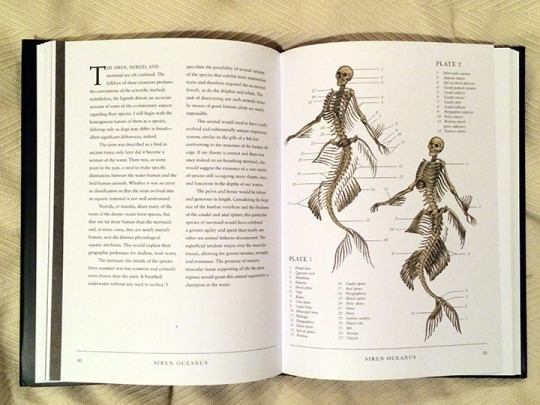


AUTHOR RESEARCH
E.B. Hudspeth is the author of The Ressurectionist: The Lost Work of Dr. Spencer Black, a book about a scientist studying anatomy and creatures not of this world.
This book has always intrigued me as someone who has always been fond of the fantasy/horror genre. Books are generally a large inspiration and influence in my life, and The Resurrectionist falls into the category of artistic inspiration. The studies and anatomy drawings of the creatures in E.B. Hudpseth's book are the kinds of things I've been thinking about for this project especially. I thought of this book as I was researching the sheep bones.
#anatomy#fantasy#the resurrectionist#literature#project work#research#k00295837#disrupt#concept development#inspiration
8 notes
·
View notes